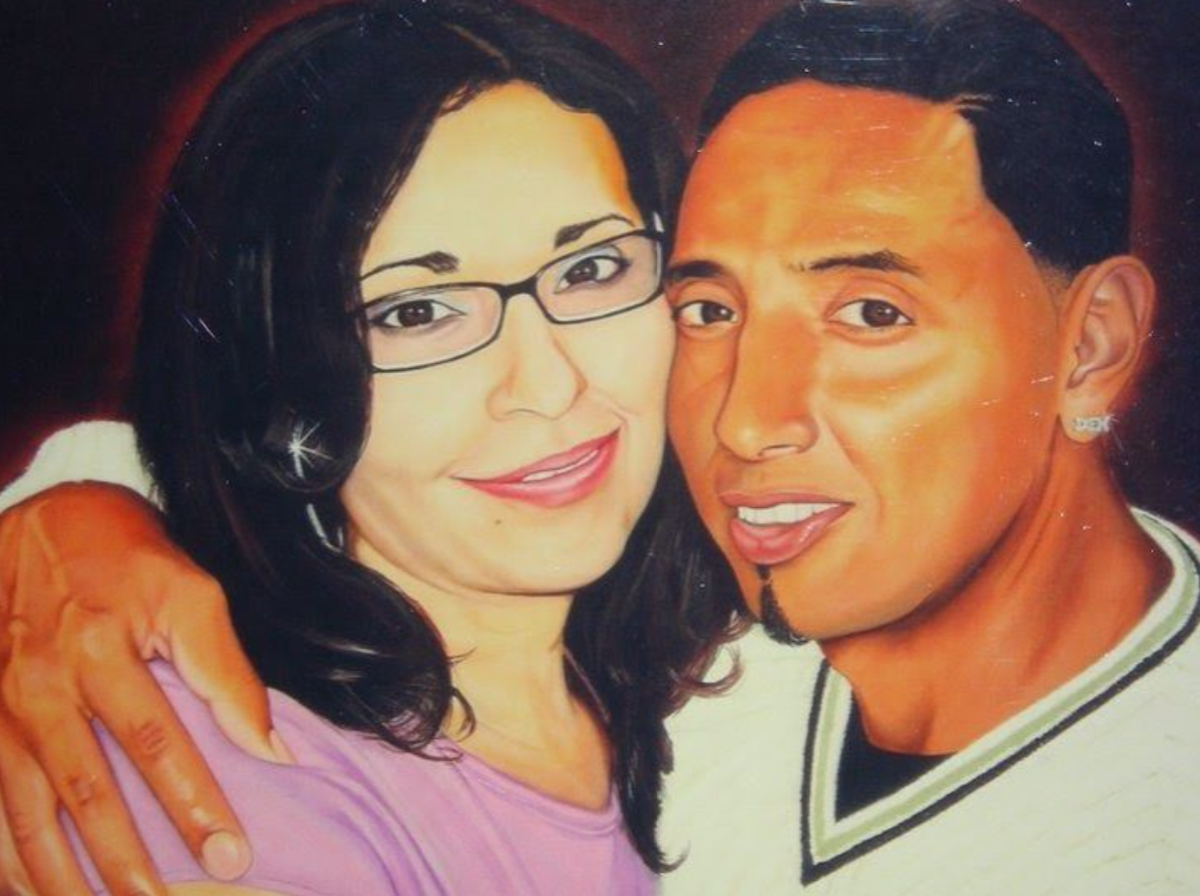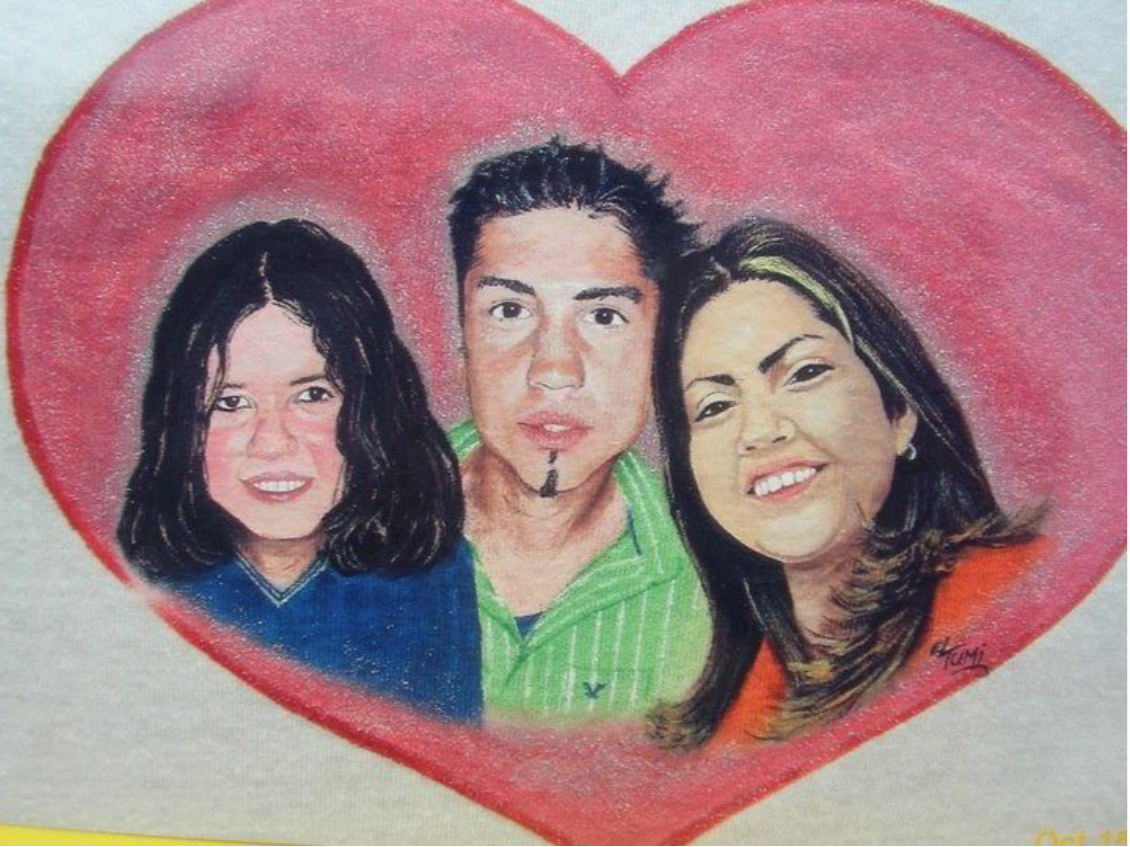

Denis Calderón took solace in creating art while wrongfully imprisoned. This is a picture he drew of himself and his wife, Marisol.
By Lynn Zhong and Adrianna Torres-García
Cruelty has taken a new form in President Trump’s executive order halting many types of family-based immigration to the U.S. amid a global health crisis. But family separation has been a reality for many in the United States long before COVID-19 forced us into quarantine, even long before the policies of the Trump administration incarcerated and deported thousands. Jesenia Calderón, a young health care worker, cannot shelter in place with her father. This is because her family was ruptured years ago by racism, white supremacy and a broken justice system, when her father Denis Calderón and Denis’ cousin Julio Maldonado were victims of a hate crime. They were wrongfully targeted by law enforcement while their attackers went free. Both cousins ended up being deported to Peru.
A hate crime is a violent crime that is motivated in whole or in part by a perpetrator’s bias against a race, religion, disability, sexual orientation, ethnicity, gender, or gender identity. Anyone who learns Denis’ and Julio’s story can conclude that what happened one 1996 night —and the events that unfolded after— was in fact a hate crime. But the gap between hate crime incidents that occur and reported incidents in the United States is immense. Besides the fact that most don’t get reported, the Southern Poverty Law Center attributes this to a variety of factors, including the improper identification of hate crimes. A more matter-of-fact interpretation is that racially-biased police and district attorney’s offices are often complicit in the perpetuation of hate crimes. This perpetuation can occur passively, as state and local authorities hold the power to turn their heads and simply wave them off with claims of inconclusivity.


Art by Denis Calderón
The inadequate attention and pernicious handling of hate crimes by our justice system is tragically exemplified by the case of Denis and Julio, cousins who were both born in Peru, but had grown up and lived in the United States since they were children. On the night of August 4, 1996, Denis and Julio were making their way towards a bar in Northeast Philadelphia. That night, a large gathering of 20 or more young, white men were crowded on the sidewalks, drinking, laughing, taking up public space as their own. As Denis and Julio neared, the young white crowd, boisterous and drunk, began hurling racial slurs at the Latino men, telling them to “Go back where you came from, you spics.” The next thing Denis and Julio knew, beer bottles were whizzing past their heads, as they turned and began racing back towards Denis’ house, to Denis’ wife and children. As the racist mob chased the two down, chaos and fighting ensued. One member of the group, Christian Saladino, fell amidst the pandemonium. He was hospitalized and years later passed away.
Denis and Julio were charged with aggravated assault while Mr. Saladino was still alive. They were accused, by the crowd and other supporters of Mr. Saladino, of having hit him with a hard and heavy object. There was no medical evidence to support a blow to the head, but they were brought to trial anyway. They were convicted of aggravated assault, despite the fact that all of their actions (none of which resulted in contact with Mr. Saladino), were taken in defense of themselves or one another. When Mr. Saladino died, they were tried for murder and acquitted. During that trial, pieces of evidence were uncovered and produced that confirmed that they had been innocent of the assault. Though a judge granted them a new trial on the aggravated assault conviction, disgraced former District Attorney Seth Williams appealed that decision in order to uphold a conviction from which he gained politically.
In an all-too-familiar story, the non-white men were forced to bear the responsibility of the reprimandable actions of white men. After an incident where a group of white men assaulted two Latino men, after Denis was treated at the hospital for knife lacerations on his body, it was Denis and Julio who ended up sitting in police cars and in court, eventually in prison, and finally deported to a different country, separated from home and their families in the United States. Law enforcement never questioned any of the white men as the perpetrators. The DA’s office never held the white men responsible despite overwhelming evidence of their aggression and neighbors’ testimony.
Dennis and Julio lost not only their freedom, but also years of family memories. They continue to pay for this injustice in Peru, where they are separated from their spouses, children and families. Now they are fighting for justice, working towards a pardon or other post-conviction relief. They hope this struggle will reunite them with their families in the U.S., where they may have the opportunity to care for each other, as we all have done, during these uncertain times.



Yes I know this story well, I attended some of the hearings with Juan Carlos Calderon who was a good friend and the Brother of Denise, I attended some of the hearings for support of the family, as I sat there and heard the case I was almost certain that the case would be droped and dismissed, I moved to Puerto Rico since and didn’t know the outcome of the case tell now; I felt that they were unfairly charged, and yes it was racist Discrimination against them.